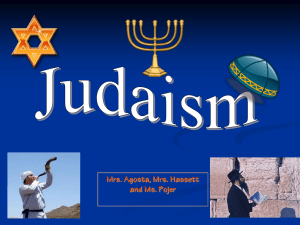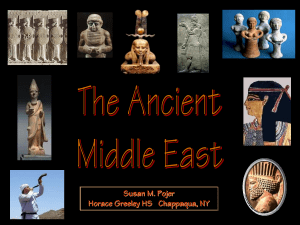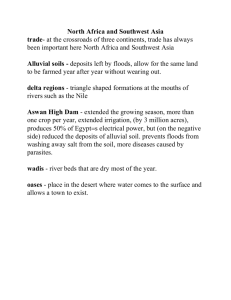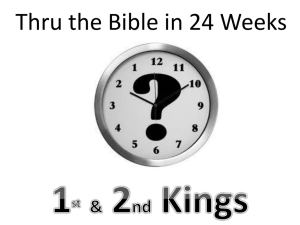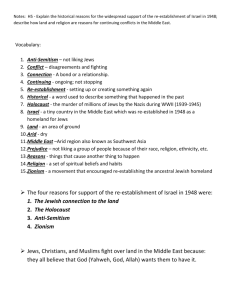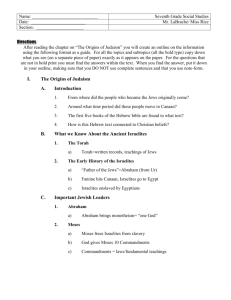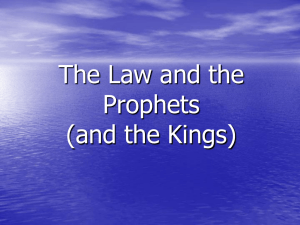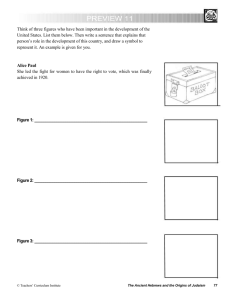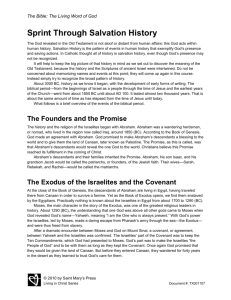The Hebrews and Judaism Shorter
advertisement
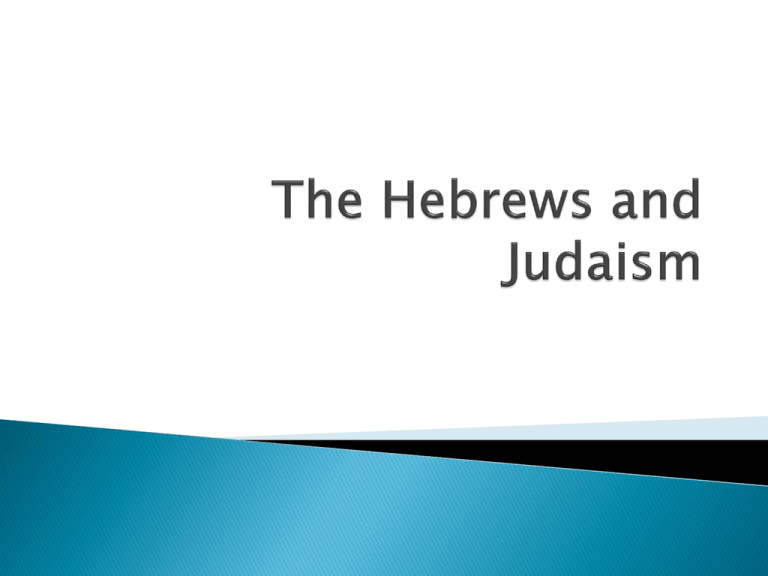
A shepherd named Abraham was named by GOD to be the father of the Hebrew people (around 1800 B.C). Abraham lived in Mesopotamia in a city-state called Ur. God told Abraham to leave Settled in the land of Canaan. (Israel) Abraham’s son, Isaac, is of the line that eventually became the Jews. Isaac’s son Jacob (also known as Israel) had twelve sons. Ten of these sons and two grandsons were the fathers of the 12 tribes of Israel. During a famine in Canaan, the starving Canaanites went to Egypt, where Joseph (a descendent of Abraham) was a top advisor to the Pharaoh. The Canaanites lived in peace in Egypt for several generations. After a new Pharaoh came to power, the Jews were forced into slavery. GOD commanded Moses to lead the Israelites out of Egypt. This became known as the Exodus. The Israelites wandered the desert for 40 years. In the wandering Moses climbed Mt. Sinai and received the Ten Commandments from GOD. During the war with the Philistines( around 1000 B.C.), A shepherd boy named David was chosen to fight the greatest Philistine warrior Goliath. David killed the Philistine with a sling and a stone. After the death of Saul, Samuel named David the second King of Israel. David’s army won control of Jerusalem and made the city his capital. David was a great military leader, helped to grow the Israeli economy and was a fine poet and musician. His writings and works can be found in the book of Psalms. David chose his son, Solomon to become the third King of Israel (around 962 B.C.). Solomon helped grow the Israeli economy through more trade and taxes. This economic growth helped to finance Solomon’s overseeing the building of the first Temple in Jerusalem. Solomon died around 922 B.C. After Solomon’s death, his son Rehoboam took over as king. Ten of the northern tribes rebelled against the high taxes of the king and Israel split into two kingdoms. The split in the original kingdom left both the Israelis and Judeans vulnerable for attack. The Assyrians attacked the Northern Kingdom of Israel and defeated their weak army . The Babylonians, under King Nebuchadnezzar, attack the Judeans and took Jerusalem and destroyed Solomon’s Temple (around 586 B.C.). Many of the residents of Jerusalem were forced into slavery of exile. The Persians defeated the Babylonians and their leader Cyrus had a policy of toleration. The Judeans were freed from exile and slavery and allowed to return to Jerusalem. The Jews begin rebuilding the Temple and the second Temple was finished around 445 B.C. In 63 B.C. the Romans conquered Judah. The Romans allowed the Jews to have Jewish leaders, but all leaders were selected and approved by Rome. After several attempted rebellions, Titus, who was in charge of the Roman forces in that area, stormed Jerusalem and destroyed the second Temple. The Jews were again exiled around 70 A.D. This was known as “Diaspora”, the Greek word for scattered. After this, there was no Jewish state until 1948 A.D. Judaism is a Monotheistic (there is only one God). The holy book is the Tanak The Torah is the first five books of Genesis, Exodus, Leviticus, Numbers and Deuteronomy. They have a written law code called the Ten Commandments. The founder of Judaism is considered to be Abraham You need to create an illustrated timeline of Judaism and the Hebrew people. This is to include items from Abraham to the founding of the new nation of Israel in 1948. (AT LEAST 7) You may use this PowerPoint, your textbook, the internet or any other references you need to complete the assignment. These are due Friday and you will present them during class.
